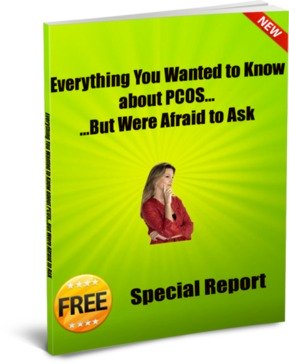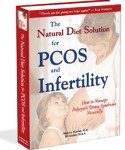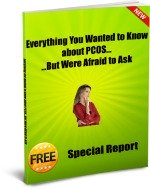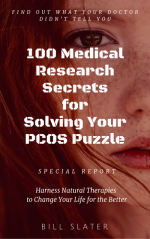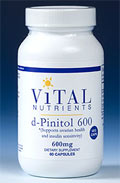PCOS Review Newsletter #53
1) The Thyroid-Progesterone-PCOS-Infertility Connection
2) Selenium Supports Your Thyroid
3) Almonds Help Control Blood Sugar, Lower Cholesterol
1) The Thyroid-Progesterone-PCOS-Infertility Connection
Summary: If your thyroid gland is healthy, your ovarian function will improve!
We've said many times that PCOS is not solely an ovarian disorder. Rather, it's a systemic disorder involving in some way almost every organ, gland and cell in your body. All of your cells are in constant communication with other cells via hormones and a huge array of other signaling molecules. Your body is a complex web of communication and interaction.
To get the best long-term results, you'll want to shift away from thinking in terms of single, simple problems. Or single, simple solutions such as birth control pills or metformin.
We've said in our book and on this site that women with polycystic ovary syndrome also may have thyroid, liver, or adrenal gland problems in addition to ovarian problems. We've also discussed the involvement of fat cells, the immune system, and your brain. All of these organs and systems are intimately interconnected.
Take your thyroid gland for example. Many women (and some doctors) think that thyroid function has little to do with your ovaries. But that is not the case.
Thyroid hormone stimulates progesterone production in your ovaries, thus allowing you to complete your menstrual cycle. You cannot become pregnant unless you have sufficient progesterone to provide a supportive environment in your uterus for the egg.
You may know that women with PCOS and infertility problems commonly have chronically low progesterone. That's one reason why the supplement chastetree berry (vitex) can help with fertility and pregnancy, since it helps the body to create more progesterone.
So a healthy thyroid is a partial solution to more optimal hormone production in your ovaries. Your thyroid also influences production of SHBG (sex hormone binding globulin), prolactin, and GnRH (gonadotropin releasing hormone), all of which affect your cycle and your ability to become pregnant.
So heres a vital question.
Do you know whether your thyroid gland is working properly? Or whether you have an "invisible" thyroid disease such as autoimmune thyroiditis?
If your thyroid is not in good shape, it cannot do a good job of helping your ovaries to produce progesterone, nor can it do all the other things it needs to do to help you ovulate and have a complete cycle that can result in a pregnancy. Moreover, thyroid dysfunction increases your risk of miscarriage.
If you are seeing a doctor about your PCOS or fertility issues, has he or she performed a thorough review of your thyroid function? If not, you should be absolutely sure your doctor performs a thorough assessment of your thyroid gland function. Tell your doctor that you are aware that sometimes even a normal thyroid panel blood test does NOT necessarily mean that your thyroid is healthy.
A typical thyroid blood test may not detect that you have a "hidden" thyroid disorder called "autoimmune thyroiditis". This is a condition where your own immune system is attacking and destroying cells in your thyroid gland.
Autoimmune thyroiditis is more common than you may think. For example, in a study from the University of Essen in Germany, one of every four women with PCOS where shown to have thyroid antibodies, an indicator of autoimmune thyroiditis. In addition, these women were tested with an ultrasound. The ultrasound showed structural signs of damage in two of every five PCOS women, which was six times the rate for the non-PCOS women.
So what difference does it make if you have autoimmune thyroiditis? For one thing, you don't want your immune system to kill off your thyroid cells, because if too many of them die, you will have to take thyroid pills for the rest of your life. Secondly, there is an association between autoimmune thyroiditis and miscarriage, even in those women whose blood tests say their thyroid is "normal".
So clearly, if you have polycystic ovarian syndrome, you need to know how your thyroid is doing. Not only should you get an ordinary "thyroid panel" and "thyroid stimulating hormone" blood test, you should also ask your doctor for an autoimmune thyroiditis blood test as well.
So what can you do if you find out your thyroid is under-functioning, or your immune system is attacking your thyroid?
In addition to possible medical treatment, the first step is to always improve the quality of your diet.
Good nutrition supports your thyroid as well as other cells and organs in your body. We'll discuss one of those nutrients (selenium) in the next article.
You can also review chapter 4.4 of our diet book, where we discuss the possibility that soy foods may interfere with thyroid function.
By the way, we've only touched on a few aspects of how a healthy thyroid can help you. We also did not discuss how progesterone and other hormones affect thyroid function. Please do your own research to learn more.
Other relevant newsletter links:
Hypothyroidism and PCOS
Relationship Between Insulin Secretion, and Thyroid and Ovary Function
Sources:
Datta M et al, Thyroid hormone stimulates progesterone release from human luteal cells by generating a proteinaceous factor, J Endocrinol. 1998 Sep;158(3):319-25
Poppe K et al, Thyroid disease and female reproduction, Clin Endocrinol (Oxf). 2007 Mar;66(3):309-21
Poppe K et al, Thyroid autoimmunity and female infertility, Verh K Acad Geneeskd Belg. 2006;68(5-6):357-77
Janssen OE et al, High prevalence of autoimmune thyroiditis in patients with polycystic ovary syndrome, Eur J Endocrinol. 2004 Mar;150(3):363-9
2) Selenium Supports Your Thyroid
Selenium is one of many minerals that are critical to health. Selenium performs a multitude of functions in your body including support for thyroid and sex hormone production. Selenium is essential for optimal endocrine (glandular) and immune function, and for moderating the inflammatory response. All of these issues are relevant to polycystic ovarian syndrome.
We recently came across a couple of very interesting medical studies of selenium.
The first one, from Jagiellonian University in Poland, was a study of healthy adolescent girls. The researchers found an association between selenium levels and thyroid hormone and progesterone levels.
In other words, those with the highest levels of selenium also had the higher levels of thyroid and progesterone hormones. This study suggests that adequate selenium plays a role in healthy thyroid function and may indirectly support the body's production of progesterone.
The other study, from the GATA Haydarpasa Dept. of Nuclear Medicine in Turkey, studied women with autoimmune thyroiditis who were given selenium. In general, selenium supplementation reduced thyroid antibodies, which is a blood test indicator of the severity of autoimmune thyroiditis.
However, a low dose of 100 mcg per day was insufficient to reduce the thyroid antibodies. To be effective, a dose of 200 mcg per day was needed.
Why is this information important to you? As we said in the first article, as many as two of every five PCOS women may have autoimmune thyroiditis. Are you one of those two?
If so, it's wise to take steps to protect and save as much of your thyroid gland as possible. A healthy thyroid will help your ovaries to be healthier.
Selenium is one of a number of nutrients that can protect your thyroid. This is one reason why we recommend that people take a high quality multi-vitamin/mineral supplement so that they are more likely to be getting adequate levels of nutrients such as selenium.
Sources:
Zagrodski P et al The interaction between selenium status, sex hormones, and thyroid metabolism in adolescent girls in the luteal phase of their menstrual cycle, Biol Trace Elem Res. 2007 Winter;120(1-3):51-60
Turker O et al Selenium treatment in autoimmune thyroiditis: 9-month follow-up with variable doses, J Endocrinol. 2006 Jul;190(1):151-6>
3) Almonds Help Control Blood Sugar, Lower Cholesterol
We recommend that you occasionally have some raw almonds or other nuts. There's increasing evidence that they are good for you.
Recent studies have shown that when almonds are added to the diet, cholesterol levels tend to go down. In addition, the blood sugar and insulin response to carbohydrates in a meal is more moderate if almonds are added to the meal.
It's thought that almonds provide antioxidant protection that may reduce the risk of developing heart disease.
Since women with polycystic ovary syndrome often have issues with cholesterol, blood sugar and insulin, almonds are a welcome addition to the diet.
Sources:
Josse AR et al, Almonds and postprandial glycemia--a dose-response study, Metabolism. 2007 Mar;56(3):400-4
Jenkins DJ et al, Almonds decrease postprandial glycemia, insulinemia, and oxidative damage in healthy individuals, J Nutr. 2006 Dec;136(12):2987-92
Thought for Today: "Go confidently in the direction of your dreams. Live the life you've imagined" -- Henry David Thoreau
PCOS Health Review
This free newsletter gives you original and immediately usable information to help you deal with PCOS.
Get the latest research, tips for improving your health, answers to questions, success stories, and more!
Your e-mail address is totally secure. We will never misuse your information.
Enter Your Email Above to Subscribe Today
and Get Your Questions Answered in this Free Special Report!
